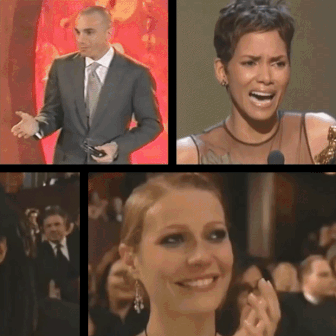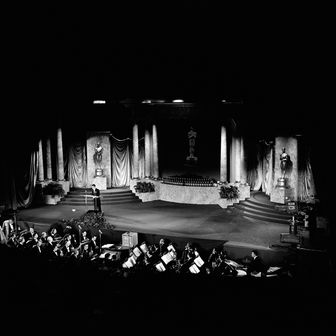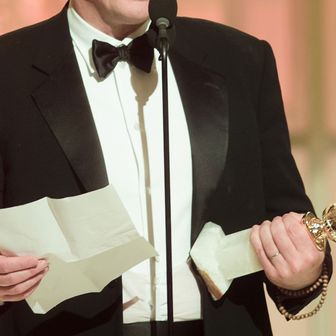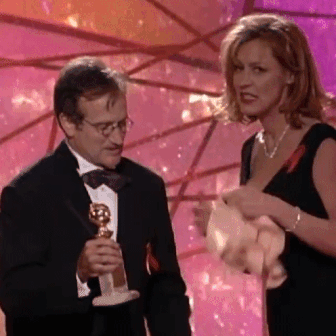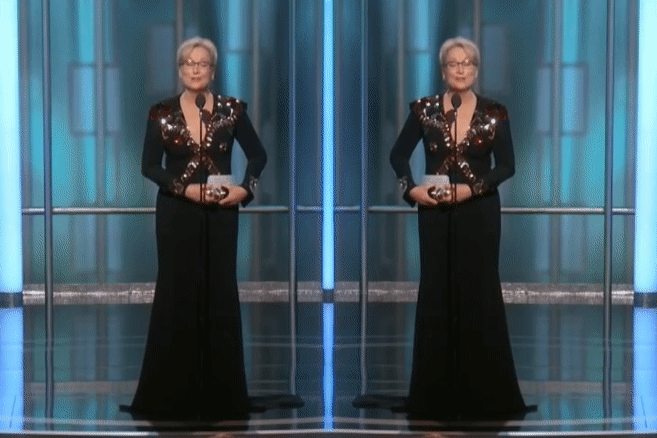
It was January 8, 2017. We were less than two weeks away from Donald Trump being sworn in as the next president of the United States, and the mood of liberal America had swung from rage to discombobulation. La La Land — somehow the most polarizing piece of art at the moment — was nominated for seven Golden Globe Awards and was about to win them all. At that same ceremony, the legendary Meryl Streep was receiving the Cecil B. DeMille Award for lifetime achievement. After an incredible presentation by Viola Davis (who called Meryl a “thief” but in a good way), Streep stepped onto the stage, her voice noticeably hoarse from protesting the incoming president, and delivered an equally incredible acceptance speech. She proceeded to excoriate Trump (though she never mentioned his name) for his bullying, his sexism, and his scapegoating of immigrants.
The speech, as you might expect, killed in the room. And it made the then-president-elect so mad that he lashed out at the actress. But it didn’t matter. By transcending mere potshots at Trump with an exaltation of Hollywood and the art of filmmaking as a sanctuary for empathy at a time when the White House sorely lacked it, Streep was as popular within the industry as she had ever been. Sixteen days later, her Globe-nominated performance in the slight comedy Florence Foster Jenkins — by no means a front-runner in the Oscars horse race to that point — got her a nomination for Best Actress at the Academy Awards.
To be clear: While Florence Foster Jenkins received a polite reception when it premiered in the summertime, its initial reception did not include any clamoring for it to win awards. At best, there was a groundswell for Hugh Grant’s performance (after he had appeared in The Man From U.N.C.L.E. and seemed to be on a career upswing; Paddington 2 would arrive the following year). But when the Globes and Critics’ Choice Awards began throwing nominations Streep’s way, there was something of a reverse halo effect among Oscars watchers. Florence got worse in their memory the better Streep did in awards season. Moreover, with the Best Actress field that year stacked with contenders like La La Land’s Emma Stone, Jackie’s Natalie Portman, Elle’s Isabelle Huppert, Loving’s Ruth Negga, Arrival’s Amy Adams, and 20th Century Women’s Annette Bening, most people assumed even an Oscar magnet like Streep would have to sit out this final stage of the season. But then came the Globes speech and suddenly Adams and Bening were on the outside looking in at Streep’s 20th Oscar nomination.
But what if Streep never gave that speech? What if the Hollywood Foreign Press, capricious and pliable as it was always prone to be, had decided to give that year’s DeMille Award to someone else? What if they opted to honor Oprah Winfrey (as they would the following year), Tom Hanks (two years after that), or Diane Keaton (never awarded!)? Would the FloFoJo momentum have died out? Who gets that Oscar nomination instead? What else plays out differently as those changes to the timeline ripple outward?
1.
Meryl is out, Amy is in.
Without the momentum of that Golden Globes speech, Streep’s performance as the famously awful opera singer in Stephen Frears’s Florence Foster Jenkins sinks back into the morass of its own middling reviews. So when the Oscar nominations are read, it’s Arrival’s Amy Adams who makes the Best Actress list. It only makes sense, given that Denis Villeneuve’s film was a Best Picture and Best Director nominee. It also premiered right after the Trump election and benefited from its timely themes of communication across barriers and welcoming outsiders who mean us no harm. Adams makes sure to mention those themes on the Oscars campaign trail. She joins the Women’s March and gets some public digs in about how Trump would treat visiting aliens. A narrative kicks in that this is Adams’s sixth career nomination and she still hasn’t won — isn’t she incredibly overdue for a trophy?
Meanwhile, Emma Stone, who had up until this point been the Best Actress front-runner for her singing, dancing, emoting performance in La La Land, is starting to feel the cold hand of the La La Land backlash creeping up on her. Come Oscar night, the Moonlight vs. La La Land war for the soul of American culture has reached volcanic proportions. Nobody knows it as everybody takes their seats for Jimmy Kimmel’s monologue, but Moonlight has already won Best Picture, its name typed out on a card inside one of the many unopened envelopes backstage. On another envelope is the name Amy Adams.
In our timeline, Streep was Oscar nominated, but she wasn’t really in the running to win a fourth statue for FloFoJo so the voting more easily slipped into a three-way race (against Portman and Huppert) in favor of Stone. But in this alternate timeline, Adams opens the category back up, making it a four-way scramble, and in the end, she slides by for a Best Actress win for Arrival.
2.
Faye Dunaway and Warren Beatty announce a different mistake.
As those of us in the primary timeline were all made intimately aware back in early 2017, the Oscars have a duplicate set of winners’ envelopes, one for either side of the stage. The whole Best Picture snafu with La La Land and Moonlight happened because Faye Dunaway and Warren Beatty were handed the duplicate envelope for Best Actress rather than the original envelope for Best Picture. In this alternate timeline, the messy Price Waterhouse Coopers employee still hands the wrong thing to Dunaway and Beatty, but since Adams won Best Actress, they read “Arrival” instead.
However, Arrival isn’t a nominations leader, it isn’t the odds-on favorite to win Best Picture, and it didn’t just win Best Director moments before this award announcement. So when Dunaway and Beatty mistakenly read “Arrival,” the producers, presenters, and backstage folks twig the mistake a lot quicker; they investigate the envelope right away, they recognize the error, and acknowledgment of the blunder is made before Jeremy Renner anyone from Arrival can reach the stage. The event coordinators even manage to settle the audience down and open the real envelope, giving the team from Moonlight a proper Best Picture upset moment.
3.
Feud: Close vs. Stone
Fast-forward about 18 months. Stone is not an Oscar-winning actress, but she does have a slight air of “overdue” to her now, too. She’s a two-time nominee, and she’s really challenging herself creatively, like in this one movie she has coming out from director Yorgos Lanthimos — you know, the guy who did Dogtooth and The Lobster. This one’s a costume drama called The Favourite, and Stone plays a scheming social climber in the court of Queen Anne. Could be interesting!
With the prerelease buzz around The Favourite crowning it as another crack at the Oscar for Stone, the category designations for that movie’s three lead actresses — which are up for debate among fans and Oscars weirdos (hi) in every timeline — get shuffled around again. There is absolutely a reading of The Favourite as Abigail’s story; she’s the one who transforms the most during the film, from rags to riches to rabbits. In this mirror universe, that reading wins out and Stone is campaigned as a lead, while Olivia Colman and Rachel Weisz compete in Supporting.
But Best Actress at the 2018 Oscars is also a referendum on Glenn Close, who could coast into the race on the good reviews of her performance in the small, slight indie The Wife. Coupled with the fact that she’s a seven-time nominee who has never won, the buzz snowballs. In the end, Close and Stone split victories at the Golden Globes, Close for drama and Stone for comedy, and split the vote at the SAG Awards, clearing the way for Lady Gaga to win and deliver a truly bananas speech upon her subsequent victory. Suddenly, everybody’s picking Gaga as their dark-horse Oscar winner. Close’s emotions are in free fall as the Oscars ceremony nears; she responds to the most benign red-carpet questions with panicked laughter and dances “Da Butt” during the ABC Oscars preshow as hosts Nick and Vanessa Lachey are left completely aghast.
When the time comes for the Best Actress award, it goes to Stone. Close by this point is zooted out of her mind and is just riding the wave of the universe’s fickle plans. It’s Gaga who breaks into a million little pieces internally (she maintains a deeply intense “straight face” during the broadcast to hide the pain). Onstage, Stone isn’t as funny as our universe’s Colman, but she effusively thanks her cast and director, and when she scans the crowd for anyone she might have forgotten, she finds one friendly face and exclaims, “Yalitza Aparicio!” before scooting offstage. In the weeks and months that follow, Close tries to take her seventh Oscars defeat well. She’s meditating. She’s making use of the karaoke machine Kevin Kline and Phoebe Cates got her for Christmas a few years ago. She’s brewing the fuck out of some tea. Then she clicks on a Deadline link and sees it: “Stone to Play Title Character in Disney’s Live-Action ‘Cruella.’”
4.
Close gets as many Dalmatians as she wants.
For the next year, Close is on the horn with every executive at the Walt Disney Company. She calls in her chips: every favor that’s owed her, every nasty piece of gossip she can threaten someone with, every quid pro quo she can think of. She pulls the strings, she gets the money, and it’s a green light for 103 Dalmatians. Stone might have made it to theaters first with Cruella in 2021, but Close will have the last laugh when she demands a theatrical-first release for 103 Dalmatians — which she has directed herself — and Disney gives her the weekend they had already assigned to Wish. Here’s the real pisser: The film is a HUGE hit. The people’s Cruella de Vil is back, and audiences come out in droves for her. Critics are even charmed well enough by Close’s acting and directing, and the Hollywood Foreign Press gives her a nomination for Best Actress in a Musical or Comedy for 2023. Also nominated in that category? Stone for Poor Things.
No one has ever campaigned for a Golden Globe Award harder than Close does for 103 Dalmatians. Not even Sharon Stone for The Muse! Close also enacts a Joan Crawford–style whisper campaign against Emma Stone. “Another win for a Yorgos Lanthimos movie? Groundbreaking.” At the Golden Globes, the Best Actress in a Musical or Comedy award goes to … Margot Robbie for Barbie.
5.
Not so fast, Hillbilly.
One silver lining that surrounds the five years of psychosis Close underwent getting revenge on Stone is that 103 Dalmatians took up all her time. Getting funding, making her directorial debut, sending Stone all those unsigned letters in the mail from someone called the Watcher? It keeps a lady busy. In light of all of that, Close reluctantly tells Ron Howard she won’t be able to star in his adaptation of that Hillbilly Elegy book after all.
Right around that time, Adams wakes up one morning and, seeing the gleaming gold Oscar she keeps on her nightstand, realizes she doesn’t have to do awards-bait-y garbage like Hillbilly Elegy anymore. So she drops out too. Faced with the loss of his two biggest stars, Howard has no choice but to put the project into turnaround and focus on the next: Apollo 14, based on the real-life Apollo lunar-landing mission where everything went fine.
But with no Hillbilly Elegy movie in 2021, the nationwide awareness of would-be politician and main character of the book J.D. Vance remains limited to those who read it. And that difference in awareness, momentum, and general reputation laundering afforded to Vance by the film means Vance loses his 2022 Senate election to Democrat Tim Ryan. With a 52-48 Senate majority for the Democrats, you’d think more would have gotten done in this universe, but alas.
6.
When Tammy met Nancy.
So in this timeline, Colman doesn’t win an Oscar for The Favourite, but that doesn’t change the enthusiasm for her performance. She’s suddenly a huge casting coup for everything from The Crown to Wonka to a cameo on The Bear (oh, you’ve had plenty of time to see it if you wanted to be surprised). She also becomes a big-time Oscars fave, nominated for her supporting role in The Father in 2020 and finally as a lead in Maggie Gyllenhaal’s The Lost Daughter in 2021. The Best Actress race that year is as competitive as ever, with Nicole Kidman (Being the Ricardos), Jessica Chastain (The Eyes of Tammy Faye), Penélope Cruz (Parallel Mothers), and Kristen Stewart (Spencer) all pulling votes. In our timeline, Colman’s recent Oscar win meant she was less likely to win a second in ’21, but that is not an issue here. Her turn in The Lost Daughter was hugely acclaimed, for good reason, and without any good explanation not to vote for her, the Oscars powers that be bypass Chastain and make Colman an Oscar winner at last.
So what of Chastain? She has now gone 0-for-3, having previously lost for Zero Dark Thirty and The Help. Her performance as Tammy Faye Bakker is something Oscars voters would usually love: perfectly performed mimicry of a famous person. Chastain came within a caked eyelash of winning for Tammy once; why couldn’t she just go for it again? She starts shopping around a project, something that would allow her to step back into her Tammy Faye Kabuki makeup and dazzle Oscars voters again without the whole thing seeming old hat: an imagined encounter between Tammy Faye and Nancy Reagan, two significant figures of the conservative movement in the 1980s. Two women who have very different reputations in the queer community based on how each of them responded to the AIDS crisis. Tammy and Nancy, meeting … at a White House dinner? On an episode of Larry King Live? In purgatory, one on her way up the escalator, the other on her way down? It’s still in development, but however it happens, it’ll include Jessica Chastain reprising her role as Tammy Faye, and in the role of Nancy … it’s Glenn Close.


